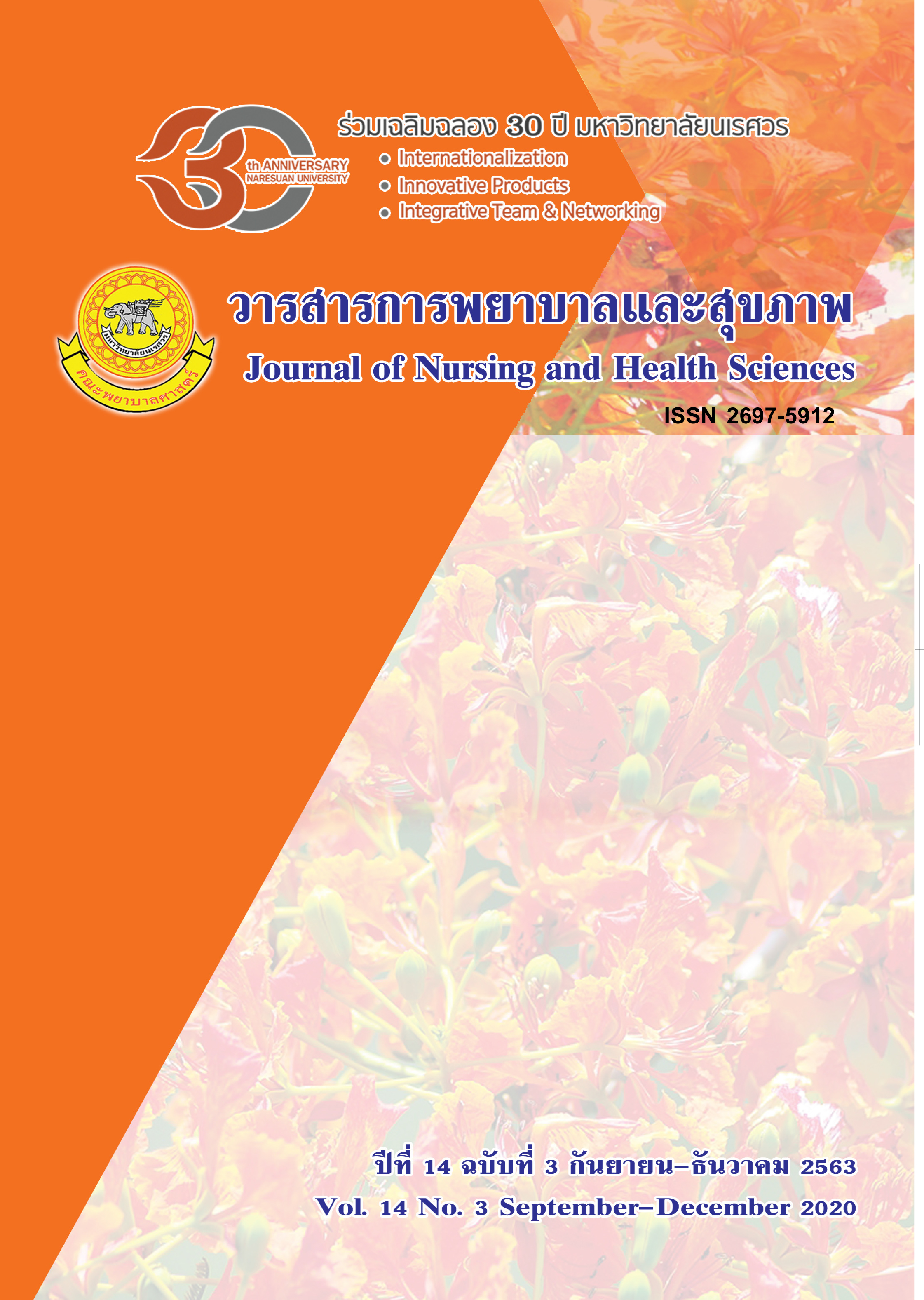บทบาทของพยาบาลในการชะลอโรคไตเรื้อรังของผู้ป่วยเบาหวานชนิดที่ 2
Main Article Content
บทคัดย่อ
โรคเบาหวานเป็นโรคเรื้อรังซึ่งต้องการการดูแลอย่างต่อเนื่อง เป้าหมายในการดูแลเบาหวานคือ การควบคุม ระดับน้ำตาลในเลือดเพื่อป้องกันภาวะแทรกซ้อน โดยเฉพาะโรคไตเรื้อรังจากโรคเบาหวานซึ่งเป็นภาวะแทรกซ้อน ที่พบได้บ่อยที่สุด พยาบาลเป็นบุคคลสำคัญที่จะช่วยให้ผู้ป่วยเบาหวานสามารถชะลอภาวะไตเรื้อรัง โดยปฏิบัติ การพยาบาลดังนี้ 1) การป้องกันในระยะเริ่มต้นและการป้องกันระยะปฐมภูมิ พยาบาลประเมินความเสี่ยง สอนทักษะให้เกิดความรอบรู้สุขภาพเพื่อควบคุมน้ำตาลในเลือด ร่วมกับค้นหาติดตามความเสื่อมของไตแต่ แรกเริ่ม 2) การป้องกันระยะทุติยภูมิ บูรณาการวิธีการเพื่อการปรับเปลี่ยนพฤติกรรมสุขภาพด้านอาหารอย่าง เข้มงวด 3) การป้องกันระยะตติยภูมิ พยาบาลติดตามดูแลใกล้ชิดเพื่อช่วยเหลือความไม่สุขสบายที่เพิ่มขึ้น โดยเฉพาะเรื่องอาหารพยาบาลควรใช้แนวทางที่หลากหลายเพื่อพัฒนาศักยภาพให้ผู้ป่วยสามารถจัดการและดูแล ตนเองได้อย่างมีประสิทธิภาพ
Article Details
เอกสารอ้างอิง
Aekplakorn, W., Chariyalertsak, S., Kessomboon, P., Assanangkornchai, S., Taneepanichskul, S., & Putwatana, P. (2018). Prevalence of diabetes and relationship with socioeconomic status in the Thai population: national health examination survey, 2004-2014. Journal of diabetes research, 2018, 1654530. https://doi.org/10.1155/2018/1654530.
Baltip, K., & Pecharattachat, U. (2016). Spiritual nursing for chronic illnesses in the community. Songkhla: Songkhla, PC Prospect. [In Thai].
Bortolon, C. B., Moreira, T. C., Signor, L., Guahyba, B. L., Figueiró, L. R., Ferigolo, M., & Barros, H. M. (2017). Six-month outcomes of a randomized, motivational tele-intervention for change in the codependent behavior of family members of drug users. Substance use & misuse, 52(2), 164–174. https://doi.org/10.1080/10826084.2016.1223134.
Buraphunt, R., & Muangsom, N. (2013). Factors affecting uncontrolled type 2 diabetes mellitus of patients in Sangkhom Hospital, Udonthani Province. KKU Journal for Public Health Research, 6(3), 102-108. [In Thai].
Chatawatee, B. (2020). Behavior and new way of life: New normal.. Retrieved 5 June 2020 from https://www.ldaworld.com/new-normal. [In Thai].
Chatawatee. B. (2016). Operation manual to operate in people with diabetes and hypertension Reduce chronic kidney disease CKD. Bangkok: Ministry of Public Health. [In Thai].
Hamalee, J., Piphatvanitcha, N., & Paokanha, R. (2014). Effect of the health belief perception promoting program on delaying progression of chronic kidney disease behavior among older adults with type 2 diabetes mellitus at risk of chronic kidney disease. Songklanagarind Journal of Nursing, 34(2), 67-86. [In Thai].
Janjumras, K., & Pipatsatitpong, D. (2016). Prevalence and risk factors of diabetic nephropathy with type 2 diabetes mellitus in Somdejprapinklao Hospital. Journal Medical Technologist Association Thailand, 44(1), 5509-5521. [In Thai].
Jittinan, A., Evamong, S., Kantachuwessiri, S., & Chailimpamontri, W. (2015). Clinical practice recommendation for the evaluation and management of chronic kidney disease in adults 2015. Bangkok: The Nephrology Society of Thailand. [In Thai].
Jirubapa, M. (2014). The slowly progressive chronic kidney disease from adult to elder persons. The Journal of Boromarajonani College of Nursing, Nakhonratchasima, 20(2), 5-20. [In Thai].
Kaensan, N. (2015). Nursing care for patients with end stage renal disease (ESRD) having peritonitis form continuous ambulatory peritoneal dialysis (CAPD) : A case study 2 case. Mahasarakham Hospital Journal, 15(2), 95-110. [In Thai].
Kochasanee, P. (2020). Renal replacement therapy today. Retrieved 12 September 2020 from https://www.nephrothai.org/wp-content/uploads/2020/08. [In Thai].
Luyckx, V. A., Tonelli, M., & Stanifer, J. W. (2018). The global burden of kidney disease and the sustainable development goals. Bulletin of the World Health Organization, 96(6), 414–422D. https://doi.org/10.2471/BLT.17.206441 .
National Health Security Office. (2011). Manual for early management of chronic kidney disease. Bangkok: The Nephrology Society of Thailand. [In Thai].
National Health Security Office. (2019). National health security fund administration manual fiscal year 2020. Bangkok: National Health Security Office. [In Thai].
Non-Communicable Diseases. (2016). Manual of action to reduce chronic kidney disease (CKD) in people with Diabetes and High blood pressure. Bangkok: Department of Disease Control Ministry of Public Health. [In Thai].
Nutbeam, D. (2000). Health literacy as a public health goal: a challenge for contemporary health education and communication strategies in to health 21st.century. Health Promotion International, 15(3), 259-567. https://doi.org/10.1093/heapro/15.3.259.
Panpiankulpak, P. (2016). The effect of food control program for chronic kidney disease patients at CKD clinic, Phra Nakhon Si Ayutthaya Hospital. Journal Of Preventive Medicine Association Of Thailand, 6(3), 205-215. [In Thai].
Phuca, W.,Vongsirimas, N., & Thanoi, W. (2020). Factors correlated with psychological well-being in patients receiving hemodialysis. Nursing Science Journal of Thailand, 38(1), 73-85. [In Thai].
Poramatikul, M., & Sriwatana, A. (2019). Exercise in patients with chronic kidney disease. In essentials in hemodialysis. Bangkok: The Nephrology Society of Thailand. [In Thai].
Rerksadayut, P., Petpichetchian, W., & Maneewat, K. (2013). Caring behaviors of perioperative nurses as perceived by perioperative nurses. In The 4th Hat Yai Academic Conference “Research for the development of Thai society” (pp. 153-160). Songkhla: Hat Yai University. [In Thai].
Riangkam, C., Wattanakitkrileart, D., Ketcham, A., & Sriwijitkamol, A. (2016). Health literacy, self- efficacy, age and visual acuity predicting on self-care behaviors in patients with type 2 diabetes. Journal of Nursing Science, 34(4), 35-46. [In Thai].
Roungjuy, S., (2008). Approach and management chronic kidney diseases. In highlight in nephrology for internist. Bangkok: Text & Journal Publication. [In Thai].
Sakulkoo, S., Wisitchainont, W., & Kankran, W. (2020). Factors influencing quality of life in end-stage renal disease patients receiving continuous ambulatory peritoneal dialysis. Journal of Nursing and Health Care, 38(1), 117-126. [In Thai].
Singprasert, R., Kanogsunthornrat, N., & Chailimpamontri, W. (2018). Effect of behavior modification program led by advanced practice nurse on clinical outcomes in patients with pre-dialysis chronic kidney disease. Thai Journal of Nursing and Midwifery Practice. 5(1), 57-74. [In Thai].
Siriwong, T., Pratipanawat, T., Hongprapas, P., & KeartChusakul, S. (2004). Guideline of slow down the degeneration of the kidneys. Journal of the Nephrology Society of Thailand,10(1), 6-16. [In Thai].
Thai Health Promotion Foundation. (2020). Static patients with kidney disease in Thailand. Retrieved 20 Febuary 2020 from https://www.thaihealth.or.th/Content. [In Thai].
Thanakitjaru, P., Bunnak, S., & Pichaiwong, W. (2015). Chronic kidney disease. Bangkok: Thai Medicine 2011-2014, Rajavithi Hospital. [In Thai].
The Nephrology Society of Thailand. (2015). Clinical practice recommendation for the evaluation and management of chronic kidney disease in adults 2015. Bangkok: The Nephrology Society of Thailand. [In Thai].
Varitsakul, R. (2014). Dietary management for slow progression in patients with diabetic kidney disease. Journal of The Royal Thai Army Nurse, 5(1), 22-27. [In Thai].
Wongsaree, C., & Krittiyawan, J. (2017). An intensive educational program on therapeutic volume overload for end stage chronic renal disease patients receiving hemodialysis: hemodialysis nurses’ roles. HCU Journal of Health Science, 21(41), 137-150. [In Thai].


